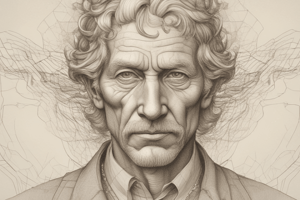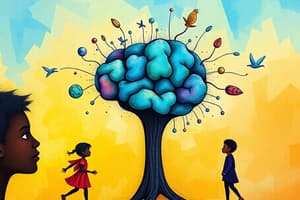Podcast
Questions and Answers
According to Erikson's stages of psychosocial development, which crisis is primarily associated with the early childhood years of 18 months to 3 years?
According to Erikson's stages of psychosocial development, which crisis is primarily associated with the early childhood years of 18 months to 3 years?
- Initiative vs Guilt
- Trust vs. Mistrust
- Industry vs. Inferiority
- Autonomy vs. Shame and Doubt (correct)
A teenager who successfully navigates Erikson's identity vs. role confusion stage is most likely to develop which virtue?
A teenager who successfully navigates Erikson's identity vs. role confusion stage is most likely to develop which virtue?
- Hope
- Will
- Fidelity (correct)
- Care
During which of Erikson's psychosocial stages does the key relationship involve a significant other or friends?
During which of Erikson's psychosocial stages does the key relationship involve a significant other or friends?
- Integrity vs. Despair
- Generativity vs. Self-absorption
- Intimacy vs. Isolation (correct)
- Industry vs. Inferiority
In Erikson's theory, the psychosocial stage of generativity vs. self-absorption is typically experienced during which period of one's life?
In Erikson's theory, the psychosocial stage of generativity vs. self-absorption is typically experienced during which period of one's life?
According to Erikson's theory, what is the key outcome of confronting the 'integrity vs. despair' crisis in old age?
According to Erikson's theory, what is the key outcome of confronting the 'integrity vs. despair' crisis in old age?
Flashcards
Trust vs. Mistrust
Trust vs. Mistrust
The first stage of psychosocial development focuses on establishing a sense of trust in the world and primary caregivers, based on consistent and reliable care. If a child successfully develops trust, they will gain the virtue of hope.
Identity vs. Role Confusion
Identity vs. Role Confusion
The fifth stage of psychosocial development focuses on figuring out who you are, your values, beliefs, and how you fit into society. If a child successfully develops a strong sense of self, they will gain the virtue of fidelity, which is the ability to live by your commitments and identify with your values.
Intimacy vs. Isolation
Intimacy vs. Isolation
The sixth stage of psychosocial development focuses on forming deep and meaningful connections with others. If a child successfully develops intimacy, they will gain the virtue of love and the ability to form lasting relationships.
Generativity vs. Stagnation
Generativity vs. Stagnation
Signup and view all the flashcards
Integrity vs. Despair
Integrity vs. Despair
Signup and view all the flashcards
Study Notes
Erikson's Psychosocial Stages
- Erikson proposed eight stages of psychosocial development across the lifespan.
- Each stage presents a crucial crisis or turning point that can be resolved positively or negatively.
- Focus is on stages 1, 5, 6, 7, and 8.
Stage 1: Trust vs. Mistrust (0-18 months)
- The central question is: Is my world predictable and supportive?
- Successful resolution results in the virtue of hope.
- Key relationships are primarily with parents (mother and father).
Stage 5: Identity vs. Role Confusion (Adolescence, 12-18 years)
- The central question is: Who am I and where am I going?
- Successful resolution leads to the virtue of fidelity.
- Key relationships include friends and role models.
Stage 6: Intimacy vs. Isolation (Early Adulthood, 18-40 years)
- The central question is: Shall I share my life with another or live alone?
- Successful resolution results in the virtue of love.
- Key relationships are with significant others or close friends.
Stage 7: Generativity vs. Self-Absorption (Middle Adulthood, 40-65 years)
- The central question is: Will I produce something of real value?
- Successful resolution yields the virtue of care.
- Key relationships include significant others, children, and workmates.
Stage 8: Integrity vs. Despair (Late Adulthood, 65+ years)
- The central question is: Have I lived a full life?
- Successful resolution results in the virtue of wisdom.
- Key relationships might include significant others, children, and grandchildren.
Studying That Suits You
Use AI to generate personalized quizzes and flashcards to suit your learning preferences.




